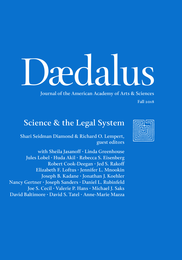From Daedalus:
Sound legal decision-making frequently requires the assistance of scientists and engineers. The survey we conducted with the cooperation of the American Academy examines the views of the legal system held by some of the nation’s most distinguished scientists and engineers, what motivates them to participate or to refuse to assist in lawsuits when asked, and their assessment of their experiences when they do participate. The survey reveals that a majority of the responding scientists and engineers will agree to participate when asked, and when they turn down requests, the most common reasons are lack of time and absence of relevant expertise. Dissatisfaction with legal procedures is also a deterrent, but our respondents indicated that some procedural changes would make their participation more likely. In addition, participation appears to be associated with a greater belief in the ability of the legal system to deal well with scientific matters.
Sound legal decision-making increasingly depends on sound science. Yet we know remarkably little about how scientists and engineers view the legal system or what leads them to decide whether and how to interact with it. Some commentary indicates that scientists regard the legal system with suspicion and discomfort, but the supporting evidence is largely anecdotal. As a result, it is hard to gauge how deep or widespread these reactions are, and – to the extent they exist – whether they are fueled by accurate information or false impressions. Getting a better handle on relationships between scientists and the law matters because the importance of science for law cannot be disputed.
Ideally, courts and litigants would be able to call on knowledgeable, unbiased scientists and engineers whenever the fair resolution of legal disputes depended on scientific or technical information. The importance of the science-law relationship led us, with the cooperation of the American Academy of Arts and Sciences, to conduct a survey of the Academy’s science and engineering members with the goal of providing empirical grounding for discussions about how scientists relate to law. Our survey probes scientists’ views of and expert involvement with the legal system, especially as it pertains to involvement in litigation, barriers to involvement, and legal or policy changes that might make scientists more willing to aid courts and lawyers when called upon.

